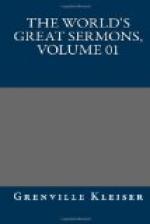Those that trust in works seem to defend them to obtain righteousness; they promise to themselves a great reward for this, by persecuting heretics and blasphemers, as they say, who seduce with error, and entice many from good works. But those that God hath chosen, learn by the law how unwilling the heart is to conform to the works of the law; they fall from their arrogancy, and are by this knowledge of themselves brought to see their own unworthiness. Hereby they receive that covenant of the eternal blessing and the Holy Ghost which renews the heart: whereby they are delighted with the law, and hate sin; and are willing and ready to do those things which are good. This is the time appointed by the Father, when the heir must no longer remain a servant, but a son; being led by a free spirit, he is no more kept in subjection under tutors and governors after the manner of a servant; which is even that which Paul teaches in the following:
Verse 3. “Even so we, when we were children, were in bondage under the elements of the word.” By the word elements thou mayest here understand the first principles or law written; which is as it were the first exercises and instructions of holy learning; as it is said: “As concerning the time ye ought to be teachers, ye have need that one teach you again which be the first principles of the oracles of God.” “Beware lest any man spoil you through philosophy and vain deceit, after the tradition of men, after the rudiments of the world.” “How turn ye again to the weak and beggarly elements, whereunto ye desire again to be in bondage.”
Here Paul calls the law rudiments; because it is not able to perform that righteousness which it requires. For whereas it earnestly requires a heart and mind given to godliness, nature is not able to satisfy it: herein it makes a man feel his poverty, and acknowledge his infirmity: it requires that of him by right which he has not, neither is able to have. “The letter killeth, but the Spirit giveth life.” Paul calls them the rudiments of the world, which, not being renewed by the Spirit, only perform worldly things; to wit, in places, times, apparel, persons, vessels, and such like. But faith rests not in worldly things, but in the grace, word, and mercy of God: counting alike, days, meats, persons, apparel, and all things of this world.
None of these by themselves either help or hinder godliness or salvation. With those of Cain’s progeny, faith neither agrees in name or anything else; one of them eats flesh, another abstains from it; one wears black apparel, another white; one keeps this day holy, and another that; every one has his rudiments, under which he is in bondage: all of them are addicted to the things of the world, which are frail and perishable. Against these Paul speaks, “Wherefore, if ye be dead with Christ from the rudiments of the world, why, as tho living in the world, are ye subject to ordinances: touch not, taste not, handle not, which all are to perish with the using, after the commandments and doctrines of men? Which things have indeed a show of wisdom in will-worship and humility, and neglecting of the body; not in any honor to the satisfying of the flesh.”




